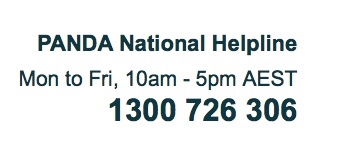Anxiety and Post-Natal Depression: An Open Letter to All Mums

I once found myself in a conversation between a group of women which went as follows: The new mum in the group, sporting that shell-shocked, sleep-deprived look that only a new mum can, was trying to describe the past 6 weeks which have been the beginning of her new life and to express just how much has changed in such a short space of time for her. The ‘veteran’ mum in the group gives her a knowing look and declares “You know one good thing that happens when you have a baby? The sex becomes FABULOUS!”.
This is met with a look of confusion from the new mum. “Really…?!”, “Yes!” nods Veteran Mum enthusiastically. “I don’t know what happens, but something changes and sex becomes just…fabulous!”.
Now, some mums may read this pearl of wisdom and nod in agreement. Others may tilt their head to the side, furrow their brow, drop their mouth in confusion and murmur “huh??”. The truth is, that this was quite an inaccurate generalisation and Veteran Mum was really just sharing her own experience. Which in itself is not a bad thing, quite the contrary. But Veteran Mum made the common mistake of assuming ‘this is how it was for me, so this is how it will be for you’, which, I may add, was probably unlikely. Veteran Mum was in the minority of women who experience this remarkable shift in their body. I wonder if the new mum headed off in anticipation of the best sex of her life to begin, only to find that she was so depleted of estrogen (as many new mums are for quite some time) that not only was sex not pleasurable for her, it was quite painful.
Did she wonder what had gone wrong with her lady bits that she wasn’t having this “fabulous” sex she was meant to be having?
My Own Anxiety and Post-natal Depression Diagnosis
Now I will share some of my experience. Not of the bedroom variety, that is for another day with another audience not of the public forum. No, I refer to my experience of becoming a new mum; I was diagnosed with post-natal depression when my baby was four months old. What I was suffering, in fact, was anxiety, coupled with depression. The blanket diagnosis for this was post-natal depression, which was a big factor in my taking some time to recognise the problem, as I had a preconceived idea of what depression is, and that was not what I was experiencing. But, a more in-depth insight into my personal experience of anxiety, what I learned about it, how it can affect people differently and all that has helped me on my road to recovery is also another topic for another day.
I don’t write this story to gain support, sympathy or accolades. I have received wonderful support from my
family and friends and am happy to report that I am doing remarkably well and currently feeling content with my life as it is, even with the challenges I faced to get here (which I never thought I’d hear myself say). But I digress: My aim with this post is to explain to all mums that your experience of motherhood is yours alone and telling another mum “how it is” based on your experience is not only inaccurate, it can cause a great deal of confusion for a mum trying to navigate her own path.
As is the case for most new mums, I was completely unprepared for the reality of motherhood and all that it brought. I was bewildered. I was in shock, I was panicked. Too panicked to bask in the ‘glow’ of this new life I had created. I berated myself, doubted myself and second-guessed everything I felt and did. I wanted away from this baby who was so completely reliant on me, and away from this life. The guilt was immense. None of this made any sense. My baby was planned. I had wanted him, hadn’t I? I was his mother. I loved him, didn’t I?
Amid all this confusion, was the information and expectations delivered to me by others and was one of the hardest things to get my head around. Their words floated around in my head like accusations of where everything was going wrong for me. I most certainly didn’t experience the “lightning bolt” overwhelming rush of love the moment my baby was placed in my arms, and joy? what joy? This was out of my control and I felt ashamed. I felt abnormal. Above all, I felt robbed and angry that I wasn’t having “someone else’s” experience and was instead stuck with my own.
Generally I am not one to measure myself against others. I tend to beat my own path through life, often to the point of rebellion, but this was all new to me. I was vulnerable, lost and didn’t realise that what I was
experiencing was actually quite common. Surely it couldn’t be. No, I must be doing something wrong (along with everything else I’m doing wrong).
Where was my joy?
My belief was that other peoples’ experience was ‘how it should be,’ not this. I felt that I was sinking and was desperately looking for a life raft. I wanted the answer from someone who knew better than me. Other mums, naturally. But in the weeks and months following his birth, I was bombarded by, undoubtedly well-meaning, but completely inaccurate assumptions: “Isn’t it just THE most amazing thing?!” “You must be on cloud nine.” “Did you ever believe you could love anyone so utterly and completely?”
I was heartbroken.
Every time someone flashed me an excited, expectant grin, coupled with the words “So, are you loving it?!” a knife twisted in my gut. Not to mention the well-worn piece of advice, “Enjoy it, it goes so fast!” Now, listen. I’m sorry, but I’m either going to enjoy it, or I’m not. I didn’t enjoy it one little bit, and people telling me to enjoy it didn’t make it so. In fact it left me feeling like I ‘should’ enjoy it, and was wrong not to.
I felt that this precious time was being wasted on unhappiness. Time which was going “so fast”. Too fast.
In case my public opening up on this issue doesn’t make it clear, I am a reasonably open and honest sort of person. This is one of the things which I believe helped me get through my struggles, as I turned to quite a few friends and family members and the support of these people will remain one of my favourite memories of my early days of motherhood for as long as I live. I saw strengths, understanding and empathy in the people I love that I didn’t even realise they possessed until I allowed myself to become more vulnerable with them than I’d ever been before. But again, I am going off-topic. Unfortunately, in conversations I had with some people, I found myself again on the receiving end of advice from people who genuinely wanted to help, but really did not have any idea of what I was personally going
through: “You get through the first six weeks, you’re home and hosed”.
After six weeks, I was no better. Possibly worse.
“Oh, it’s only after the first three months that you actually start to relax and really enjoy the whole
thing.”
OK! three months it is. Then another.
“From four months on is where it starts getting really fun. Then “six months”.
I desperately wanted to believe them. I desperately wanted to believe in the power of positive thinking, and with all of this advice, I kept telling myself to push through, be patient and just ride it out until my baby reaches a certain age and then it’ll get better.
But it didn’t. And each time it wore me down more, and left me feeling more lost and robbed and wondering when, or even if, it would get better.
Here is one valuable lesson I learned; There is no magic number. The age my baby was when I finally started to find joy in life and in him is not something I will share, as it’s not relevant and is only
my experience, and it didn’t come to me through waiting for it to happen, it came from me working with a counsellor and taking various steps to clear the fog from my head.
Also, in my experience, there was never a lightning-bolt rush of love which hit me out of the blue. My falling in love with my son took quite some time, and initially presented itself in small, blink-and-you’ll-miss-it moments of tepidly warm affection which grew in time and genuine giggling at the cute things he did. And I almost did miss it, because I was still waiting for the lightning bolt.
Now, I know I may seem pretty hard on people here.
“What do I say, then?” I hear you ask. “Do I not talk about how joyful it is for fear of upsetting someone?” Absolutely not. Nobody else was to blame for my battles. I am, and always have been, genuinely happy for any mother who had any of the above experiences. Your experience is equally as valid as anyone else’s and you should feel free to share each and every moment you wish to. Let me also clarify that I absolutely am aware that everyone meant well. I know they were trying to be positive and I know that each person who told me ‘how it is,’ genuinely believed that their experience is how it is for everyone.
But I’m here to tell you that if you assume that somebody else’s experience will be the same as yours, you will possibly find that a struggling mother will never tell you about her battles because she will be feeling shame and because you have, albeit unintentionally, shown her that you have other expectations of her.
The advice I give is this: Share. Talk. Exchange experience. Freely reminisce over the times you loved the most. But just remember to let the other person know that this was how it was for you and not “how it is”. And don’t be afraid to let her know about a bad day you once had. Every mother has them, and if you try to appear on top of it all the time and never show moments of weakness, you may succeed so well that you leave others feeling inadequate. Ask her how she’s feeling, don’t ever assume she is loving it, and if she lets you know that she is struggling, assess her situation. Find out if she is just having a bad day or if she really feels so low that perhaps she might need to talk to her GP/Maternal Child & Health Nurse/other resource.
Let her know she is not alone and her feelings are quite common. She is not abnormal. And the only piece of unasked-for advice I suggest you give to a struggling mum is: “Let me know if you ever need anything at all”.
I will include the number for PANDA (Post and Ante Natal Depression Association) if any mothers feel that they are struggling to cope. Whether you think you may have PND or are simply having a bad day, the women are happy to talk with any mums about any challenges they are facing, big or small, and I found them to be a great source of support and assistance on my road to recovery. I am also more than happy to listen and answer any questions anyone may have for me regarding my own recovery and what I have
found particularly helpful throughout the process.
PANDA – 1300 726 306
Visit www.panda.org.au
Now I will end with three things I learned about myself recently.
1. The anxiety and depression I suffered was not time wasted. I did not ‘miss out’ on joy, it just took time and hard work for it to reach me and now that I am feeling happier, I am not left wishing I could get back the months I’ve ‘lost.’ (This was one of my biggest fears and the only thing I would change in hindsight is the amount of pressure I put on myself,especially in regard to this).
2. I love my son with every beat of my heart and will love him for the rest of forever (what a relief!).
3. (After recently arguing with my husband over a photo taken of my baby when he was a few days old “Weird-looking? Are you kidding me? This is one of my favourites! He was adorable!”) Even in my darkest days when I thought there was no love, nothing good and no joy in any of it, the truth was that I was already so biased that I thought my squishy new-born baby was ridiculously good-looking.
It’s been a good week.
Amy Gray is a 35 year old married mother of an 8 month old boy. She lives by the bay, is taking a year of leave from her administration job to be a mum. She likes to write, and cook, and eat!
Read more at blog She Wore a Technicolour Ribbon














